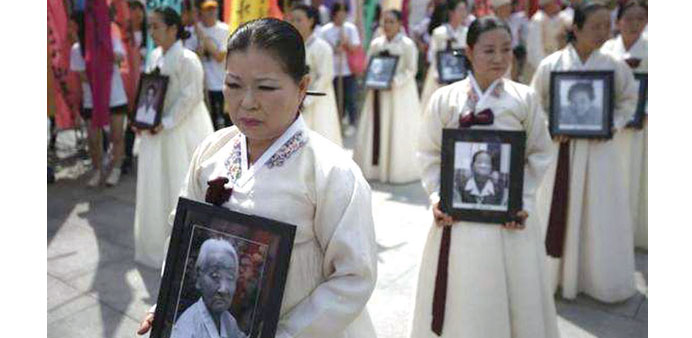Participants carry the portraits of Korean women who were made sex slaves by the Japanese military during World War II, during a requiem ceremony for former comfort woman Lee Yong-nyeo in central Seoul in August last year.
AFP/Seoul
Korean women forced into sex slavery for Japanese troops during World War II have been invited to a mass to be celebrated by Pope Francis in Seoul in August, a spokeswoman said yesterday.
The invitation comes at a time when relations between Japan and South Korea are a low ebb over Tokyo’s recent allegations that there was no evidence to corroborate the testimony of so-called “comfort women” who were forced to work in Japanese military brothels.
“We’ve invited the victims to the mass for peace and reconciliation,” a spokeswoman for the committee organising the visit, who did not wish to be named, told AFP.
The Pope will celebrate mass on August 18 at Myeongdong Cathedral in Seoul.
It was not known how many of the women, all of an advanced age, would attend, she said.
The invitation was made soon after the August 14-18 papal visit to South Korea was announced in March.
“We will inform the Pope of their participation in the mass,” she said.
Pope Francis is expected to deliver a message to the comfort women during the mass but it had not yet been decided whether he would have a chance to talk to them, she added.
South Korea expressed “deep regret” and summoned Japan’s ambassador last week to protest at Tokyo’s recent review of a landmark 1993 apology for wartime sex slavery.
The review upheld the apology, but angered Seoul by asserting there was no evidence to corroborate the testimony of Korean comfort women that they were forced to serve as sex slaves.
Seoul also rejected the review’s finding that Japan’s 1993 apology was partly drafted by South Korea.
Around 200,000 women, mainly from Korea but also from China, Taiwan and Indonesia among others, were forced into sexual slavery for imperial troops as Japan stormed across Asia before and during World War II.
While mainstream Japanese opinion holds that the wartime government was culpable, a small but vocal tranche of the political right - including Prime Minister Shinzo Abe - continues to cast doubt, claiming the brothels were staffed by professional prostitutes.
The equivocation is a huge irritation in Tokyo’s relations with East Asia, and with South Korea in particular.

